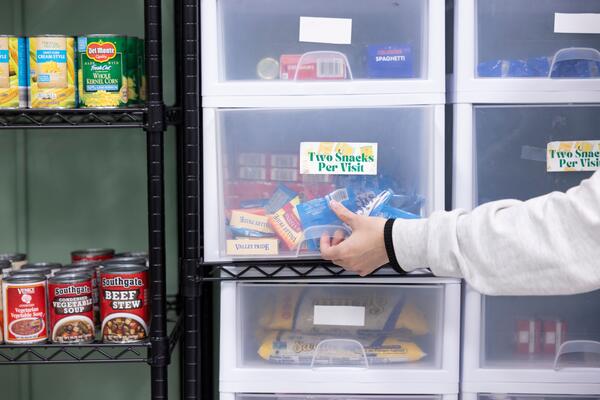
Mass. College Launches Student-Led Basic Needs Center
An estimated 59 percent of all college students have experienced some form of housing or food insecurity in the past year, according to 2024 data from the Hope Center at Temple University. Closer to three in four students have lacked access to other basic needs, such as mental health care, childcare, transportation or technology.
At Massachusetts College of Liberal Arts, it was students who first noticed their peers needed additional resources.
Spencer Moser, MCLA’s assistant dean for student growth and well-being, teaches a leadership capstone course in which students complete a community-based service project. “One group of students was aware that some of their peers were attending classes hungry,” he recalled.
As part of their assignment, students researched available resources to address basic needs insecurity and identified the need for a campus pantry.
“The program started as a drawer at my desk,” Moser said. “Then it grew to fill a shelving unit, a closet and eventually its own space on campus.”
Now, MCLA hosts an Essential Needs Center (ENC) on campus for any student who may face financial barriers to acquiring food, housing or other necessary items.
How it works: Located in the campus center, the Essential Needs Center is open 24 hours a day from Monday to Thursday, with more limited hours on Fridays. The center provides students with food, housing and transportation assistance, seasonal clothes, and more.
Students can utilize a variety of resources to address food insecurity, including grab-and-go or instant meals and free meal swipes for the dining hall, as well as help with their SNAP applications. The center’s website also provides links to recipes using MCLA food pantry staples to help students with minimal cooking experience prepare nutritious meals.
One of the unique offerings of MCLA’s center is a build-a-bundle initiative that allows students to request a variety of personal health, kitchen, bathroom, bedroom or cleaning items, as well as school supplies. Students can submit a form online requesting supplies ranging from a first-aid kit to baking supplies and a bath mat.
The pantry has a small budget from the college, which is supplemented by grants, a partnership with the Food Bank of Western Massachusetts and donor support. Interested donors can give nonperishable food items, toiletries or monetary contributions.
Student supported: The ENC first started with students looking to support their classmates, and student leadership continues to be at the heart of the center’s work.
“Students manage the inventory, make sure their peers know about this resource, staff the center,” Moser said. “The center is student-run and -managed, designed to be student-centric due to the belief that students know best what students’ needs are.”
The pantry sees 400 to 500 students use the pantry regularly, for a total of 1,313 visits between November 2023 and January 2025, Moser said.
In fall 2024 alone, ENC logged 729 visits—including from 96 first-time visitors—and distributed over 2,600 items.
Other Models of Success
Basic needs insecurity impacts college students across the country, hindering their academic progress and forcing them to choose between educational pursuits and personal needs. Here are some examples of how other colleges and universities are promoting student well-being.
- Anne Arundel Community College students in Maryland created a cookbook featuring items exclusively from the campus pantry, many reflecting their traditions and cultures.
- Some colleges allow students to pay off their parking tickets by donating food pantry items.
- Pace University offers a monthly mobile market for students, faculty and staff to receive free food items that cannot be stored for longer in the permanent campus pantry.
- The University of California, Davis, piloted a discounted food truck on campus at lunchtime, allowing students to receive a hot meal at a pay-what-you-can price.
- Virginia Commonwealth University established mini pantries across campus with grab-and-go food items, modeled off the concept of a little free library.

Source link



